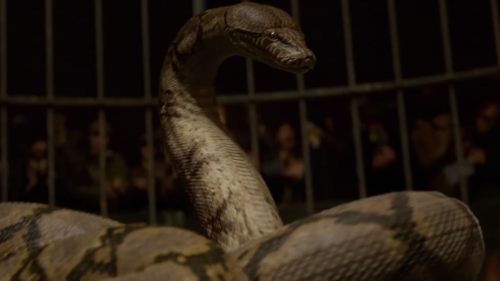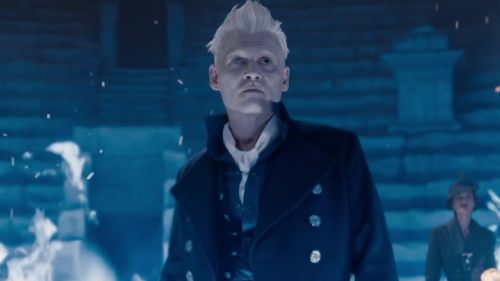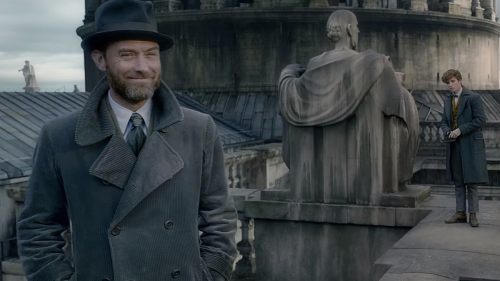FANTASTIC BEASTS: THE CRIMES OF GRINDELWALD Review: Lots Of Magic, But No, Like, MAGIC
Without Harry Potter, the Wizarding World has gone out of focus. The Fantastic Beasts episodes are pure franchise continuation — familiar and re-skinned concepts in search of a story. The narrative solution in the second film, The Crimes of Grindelwald, is much the same as it was in the first, and in the Harry Potter series: wrap fairly small character arcs in concentric layers of magical lore and, increasingly, real-world politics, and hope it all connects. So far, Fantastic Beasts is 0 for 2.
There’s a scary dark wizard (again) and a group of heroes who struggle against blinkered authority (again) and now Dumbledore, here played by Jude Law as a middle-aged flirt in tweed, pulling strings to make sure Things Go Right. The new movie even goes back to Hogwarts so that we feel at home. All of which would probably work if there were any characters to support all the ideas.
Ostensibly the hero is gangly, nature-obsessed academic Newt Scamander. He’s Doctor Doolittle meets Indiana Jones with a bit of Sherlock Holmes, played by Eddie Redmayne with a wince substituted for a grin. Newt’s stare is regularly fixed just off-axis. He’s a curious character, and an unlikely choice for the lead — the guy’s entire life has been spent off in a corner of his own world, and neither Fantastic Beasts film has figured out how to turn him into a true driving role.
Newt is reactive. He spent the previous film scampering about Manhattan after a menagerie of escaped creatures, and trying to protect a new circle of friends after a well-intentioned trip to release a single winged beast went awry. Now he’s scampering about Paris in search of Katherine Waterston’s character Tina, who has been reinstated as an Auror following the events of the previous movie. Waterston shows off Tina’s new authority and confidence with upright posture and an icy glare. She’s wrapped in a super-cool black leather coat — a sartorial step up from the “demoted office gofer” duds of the first movie.
Over on the other side of the movie is Johnny Depp’s Gellert Grindelwald, who doesn’t hold a candle to Voldemort. Johnny Depp never musters a shred of the strange bile that seemed to roil through the veins of Ralph Fiennes. Grindelwald is basically a white, er, wizard nationalist who wants to establish the superiority of magical folk over muggles. This is the most explicitly political film set in Harry Potter’s world so far. Grindelwald comes off like Rowling’s analog for Trump — and while that might feel like freedom to Rowling, it makes this play more like a screed than a story.
All the problems with repeated story concepts and underdeveloped characters are rooted in the screenwriting, which Rowling now tackles herself. The Harry Potter films were good, sometimes great examples of condensing sprawling books into films that were dense but still alive. Whatever Rowling’s process is here, the result isn’t the same. She’s introducing just as many characters and concepts as in her novels, with far less space to develop them.
So not only do characters like Tina and feel underdeveloped, the story around them feels incomplete. The Crimes of Grindelwald opens with an awful romantic miscommunication plot that keeps Newt and Tina apart while allowing for the introduction of Newt’s dull, magical G-Man brother Theseus (Callum Turner), and his fiancee Leta Lestrange (Zoe Kravitz). The less said about Theseus the better, but Kravitz, like Waterston, at least makes something out of very little material. She’s sad and bitter, but in a way that makes you hope she’ll finally agree to hang out one day.
That’s better than Claudia Kim’s Nagini, who is cursed to turn into a snake every night and eventually becomes the giant serpent in thrall to Voldemort. Her real curse is having to stand around with essentially nothing to do.
And then there’s Ezra Miller’s Credence, who isn’t as dead as the end of the last movie suggested he might be. Instead he’s joined the circus, where he meets Nagini. Credence is just “sad boi who wants to know who his parents are,” articulated over and over again. He and Nagini skulk through half the movie like mutants who aren’t sure if they’re going to side with Xavier or Magneto. Rowling and director David Yates attempt to connect them to Newt & Co. with an elaborate family tree narrative that lands as a confusing plot churn, even with a literal diagram drawn on screen to simplify the narrative.
By the end of The Crimes of Grindelwald, the Fantastic Beasts series is two films and almost five hours into a loose web of plot that really begin to intersect only just before the credits roll. It’s the big-screen version of a Netflix series, an ineffective rehash with all the bells and whistles of the Harry Potter movies, but almost none of the magic that made them work.



